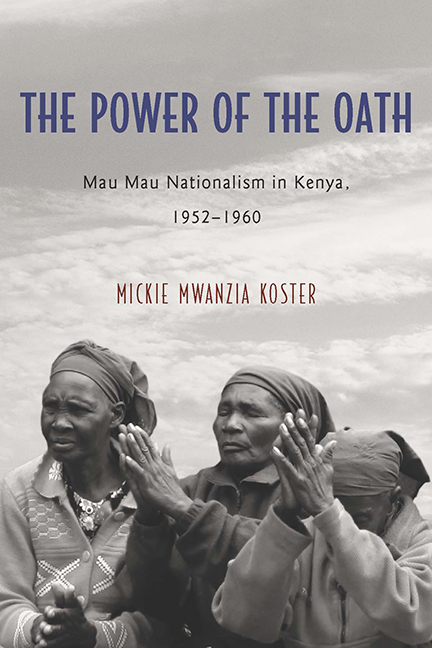1 - Discoursing Mau Mau and the Mau Mau Oath
Published online by Cambridge University Press: 07 May 2022
Summary
Is there a Mau Mau memory of relevance and value to the people of Kenya as a whole? … stories of acts of resistance and sacrifices made by ordinary men and women in the forests, detention camps and Emergency villages, in the face of harsh repression by the foreign enemy, can both inspire and unify.
—Marshall CloughThe complete Mau Mau story has not been written. Mau Mau remains a puzzle. How should it be remembered and why? The history is divisive and many unspoken legacies linger about this past, making it even more difficult to address and define. The chapter is designed to help lay out this book's argument in the larger Mau Mau maze. The Mau Mau literature is vast. In the study, “Mau Mau Inventions and Reinventions,” literature on Mau Mau from different interpreters over the past fifty years is treated supporting various political, social, and economic interests. The historiography is polarized with many different groups providing their narratives, which often support specific agendas. Interestingly, Mau Mau is very much involved in postcolonial Kenya; new narratives are constantly blending into the present. For example, the renewed interest in Mau Mau stories and British regrets and promises have provided room for a new Mau Mau discourse—an opportunity that is being seized by all. The veterans are using the platform to tell of their abuses, articulate their monetary demands, and reshape Mau Mau history. The British are using the moment to offer regrets and promises of reparation that are aimed to spin Britain's narrative for the history books, which includes the establishment of memorials offering a new way to interpret Mau Mau. The real question is, “What are we to remember now about Mau Mau?” Memorials are fixed, yet interpretations of sites are fluid and sometimes met with unexpected public reaction. We have already seen this in the case of Mau Mau hero Dedan Kimathi's monument. Kimathi was and still is a controversial Mau Mau leader. Although he was held in high esteem by Kenyan nationalists and fellow Mau Mau fighters, the British government labeled him as a terrorist and he was not highly regarded by the subsequent Kenyan governments. Kimathi's polarized interpretation continues to surface, as is evident from his monument (which provided a new space for reflection).
- Type
- Chapter
- Information
- The Power of the OathMau Mau Nationalism in Kenya, 1952–1960, pp. 19 - 29Publisher: Boydell & BrewerPrint publication year: 2016



